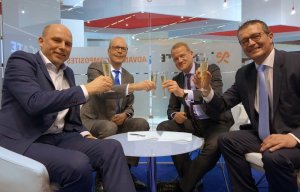
Airborne and TenCate sign supply agreement for satellite solar array systems
Airbus has recently signed an extension of its existing Memorandum of Understanding with TenCate, Stork Fokker AESP and The Netherlands Aerospace Group, in Toulouse, France. The entry of another six Dutch industrial companies and knowledge institutes to the Thermoplastic Affordable Primary Aircraft Structure (TAPAS) consortium is expected within a few weeks. The TAPAS consortium consists of companies and institutes active in the Dutch aviation industry that are work

7th April 2009
Innovation in Textiles
|
Almelo
Airbus has recently signed an extension of its existing Memorandum of Understanding with TenCate, Stork Fokker AESP and The Netherlands Aerospace Group, in Toulouse, France. The entry of another six Dutch industrial companies and knowledge institutes to the Thermoplastic Affordable Primary Aircraft Structure (TAPAS) consortium is expected within a few weeks.
The TAPAS consortium consists of companies and institutes active in the Dutch aviation industry that are working closely with Airbus in the field of materials, processing and joining technology. This technology will be further developed specifically for future Airbus applications, including primary structure parts such as fuselage and wings.
TenCate says it was the birthplace of the development of light-weight thermoplastic composite materials for the aviation industry and has therefore enjoyed a relationship with Airbus relating to developments in this field for some considerable time. Its fibre-reinforced composites originate in an innovation process based on textile technology and composite materials from TenCate consist of a compound of carbon or glass fibres that, with the addition of synthetic resins, are consolidated into plate material and marketed under the name TenCate Cetex. The characteristics of this material include the fact that when heated in a moulding press it becomes deformable (thermoplastic) and it can be industrially processed into moulded parts for wings, interiors and other parts.
Thanks to an intensive partnership with knowledge partners such as the University of Twente and the Technical University of Delft in the field of technological research and development, partners in the TAPAS consortium are able to create more applications for innovative materials. The past few decades have seen a continuing increase in the use of lightweight composite materials, including TenCate Cetex, in aircraft. Dutch companies and knowledge institutes in this way make an important contribution to the sustainable character of Airbus, TenCate says.
Group Director Frank Meurs of TenCate Advanced Composites Europe is enthusiastic: “Now that TenCate Cetex is being incorporated into aircraft interiors and secondary structural parts in an ever wider series of applications, we are approaching the moment when the major primary structure parts of aircraft will be made of thermoplastic composite. Thanks to our unidirectional tape technology, a lightweight fuselage of thermoplastic composite, for example, can also be built in the near future. Composites already bring significant and sustainable advantages through their weight-reduction, such as fuel saving, noise reduction and a reduction in emissions”.
TenCate makes a significant contribution to the efforts of Airbus to achieve eco-efficiency. This is, however, on condition that now too the technology for design methodology and the specific processing of thermoplastic are further developed. In view of the trends in the market, the scale on which the material can be used will increase considerably. Frank Meurs said: “An integral project like TAPAS, in which all disciplines in the value chain work together, is therefore invaluable to us. The aviation industry is a knowledge-intensive industry and is thus of great economic value. TenCate is proud to be able to work with other specialist Dutch players in the aviation industry”.
The Netherlands Agency for Aerospace Programmes (NIVR) and the Ministry of Economic Affairs has also been closely involved in the development and establishment of the partnership between Airbus and the Dutch industrial companies and the knowledge cluster.
TenCate Advanced Composites develops and produces advanced composite materials for the space and aerospace industry and for industrial applications. The company has advanced composites has operations in Europe and North America.
Royal Ten Cate (TenCate) is a multinational company which combines textile, chemical and materials technologies in developing and manufacturing functional materials with distinctive characteristics. Systems and materials from TenCate can be divided into four areas of application: safety & protection; space & aerospace; infrastructure & environment; sport & leisure. TenCate occupies leading positions in protective fabrics, composites for space and aerospace, armour, geosynthetics and synthetic turf. The company is listed on NYSE Euronext.

Business intelligence for the fibre, textiles and apparel industries: technologies, innovations, markets, investments, trade policy, sourcing, strategy...
Find out more